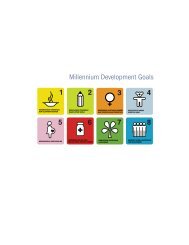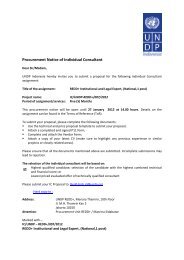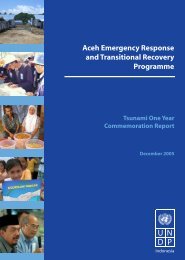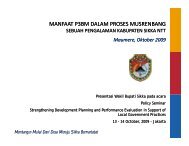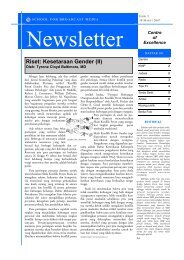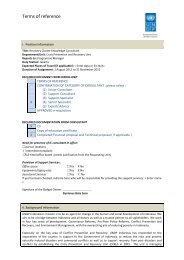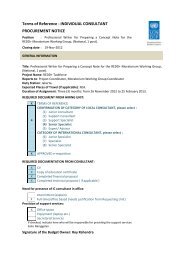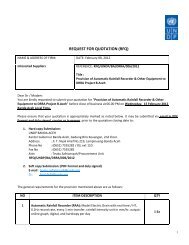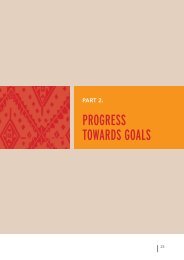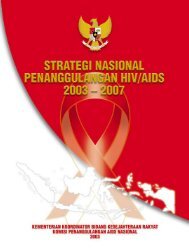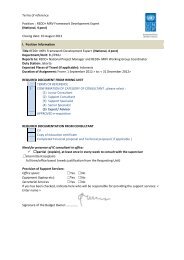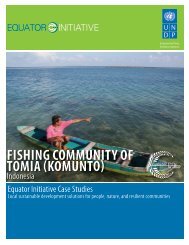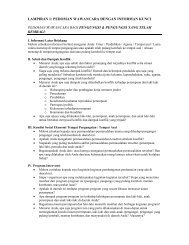Papua Needs Assessment - UNDP
Papua Needs Assessment - UNDP
Papua Needs Assessment - UNDP
Create successful ePaper yourself
Turn your PDF publications into a flip-book with our unique Google optimized e-Paper software.
Development organizations in <strong>Papua</strong> do not have a clear or complete picture of the developmentrelated<br />
activities of their peers. The need for better coordination of this information is very obvious,<br />
but collecting this information during the PNA proved difficult. If the <strong>UNDP</strong> is to assist in this<br />
area, resources for it should not be underestimated – it requires frequent face-to-face interaction<br />
with partners. The coordination must take place in both <strong>Papua</strong> (not just Jayapura) and in Jakarta.<br />
There is a need for better coordination of the <strong>UNDP</strong>’s own work in <strong>Papua</strong> including coordination<br />
between the implementation of national programmes at the <strong>Papua</strong> level, and the <strong>Papua</strong>-specific<br />
programme activities. Coordinating information, schedules and relationships with <strong>Papua</strong>n<br />
counterparts within the <strong>UNDP</strong> and with other donors will enhance impact.<br />
The need for quality technical expertise coupled with good development practitioners’ skills also<br />
should not be underestimated. To ensure that appropriate people are recruited, there is a need<br />
to go beyond the normal recruitment process using proactive and alternative networks to obtain<br />
the right candidates. Recruitment may require extra budget and time. Furthermore, recruiting<br />
appropriately skilled and qualified personnel for certain development activities in <strong>Papua</strong> means<br />
drawing on a limited pool of human resources. Consultation with local stakeholders to consider<br />
alternative arrangements may be warranted, so as to minimise the brain drain’ from local<br />
organisations and instead build up local capacities. Ensuring an appropriate mix of <strong>Papua</strong>n and<br />
migrant or outsider personnel is an important, if delicate, challenge for future development<br />
assistance in <strong>Papua</strong>. Furthermore, a genuine willingness and ability to travel and work successfully<br />
in remote areas must be carefully assessed.<br />
The <strong>UNDP</strong> staff capacities, especially in key areas such as the monitoring and facilitation of<br />
tasks, may require a special internal human resource strategy to develop individual confidence<br />
and capacities. Planning of resources should be factored around this need, so that there are<br />
specific resources dedicated to providing ‘more than usual’ on-the-job supervision for local team.<br />
Finally, the logistics of operating in <strong>Papua</strong> are complicated by the geography. Availability of<br />
quality health and education services, as well as infrastructure and transport constrain not just<br />
the local communities, but also outside agencies operating in <strong>Papua</strong>. Security issues are also<br />
such that special operating procedures are required so that obtaining visas for international<br />
personnel, including consultants, can be difficult. Clear directives and procedures for responding<br />
to human rights issues will be necessary to support programme personnel in <strong>Papua</strong>. Thus larger<br />
budgets must be allowed for operational costs, as well as for monitoring and evaluation in the<br />
design of any programme.<br />
29



